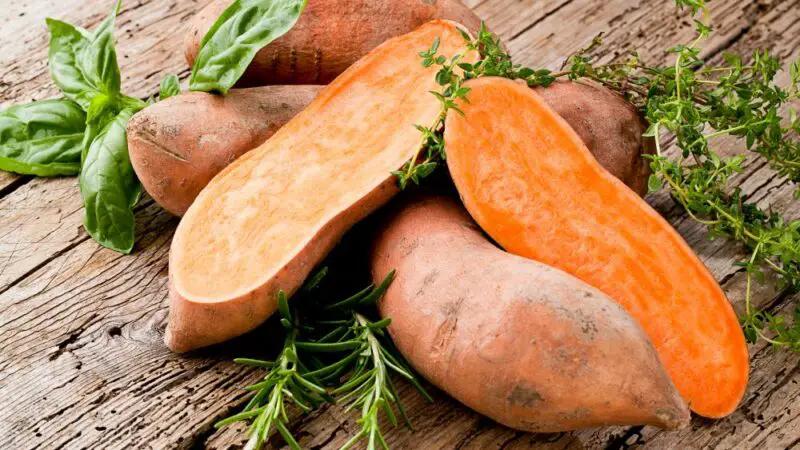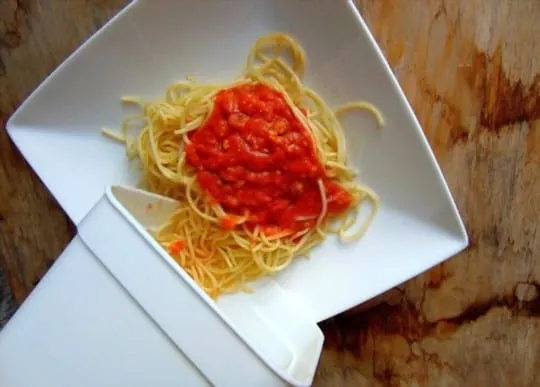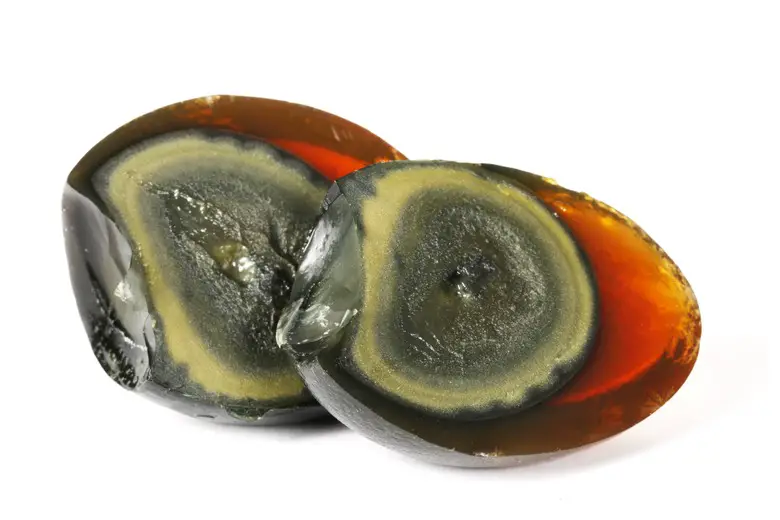Potatoes are a staple in many households, whether they are regular potatoes or sweet potatoes. The question of whether sweet potatoes take longer to cook than regular potatoes is a common one that many people have asked. In this article, we will explore the differences between these two types of potatoes and how they affect cooking times. Understanding cooking time is important since it helps ensure that your meals come out perfectly cooked.
Definition of Sweet Potatoes and Regular Potatoes
Sweet potatoes and regular potatoes come from different plant families entirely. A sweet potato has a firmer flesh than a regular potato, and its flavor is sweeter because it contains more sugar. Sweet potatoes vary in color from pale white to deep orange, whereas regular potatoes usually have light brown skin with white flesh inside.
Brief History of Sweet Potatoes and Regular Potatoes
Sweet potatoes originated in Central America over 5000 years ago before being introduced to the rest of the world by Christopher Columbus. In contrast, regular potatoes were first cultivated in Peru around 8000 years ago before eventually spreading globally.
Importance of Understanding Cooking Time for Both Types of Potatoes
Cooking times are crucial when preparing any type of meal. Understanding how long each type of potato takes to cook ensures that you will not undercook or overcook them when preparing different dishes.
What Affects Cooking Time in Potatoes
Several factors influence cooking time such as the size, shape, variety, and age of the potato. The preparation method also affects how long you should cook your potato.
Factors Influencing Cooking Time
The size of your potato can greatly affect cooking time; larger sweeter ones may take longer than smaller-sized ones while baking or boiling can speed up the process for similarly sized ones regardless of their variety type.
The shape also affects cooking time; thinner-sliced pieces cook faster than thicker slices due to their exposed surface area subjecting them to higher temperatures.
The age of the potato is also a critical factor in cooking time. Fresh produce will cook quickly, while old or even spoiled potatoes may take an extended period to become ready for consumption.
Different Preparations and Their Effect on Cooking Time
Different methods of preparation affect how long it takes for your potatoes to cook. For example, roasting and baking take longer than frying and boiling. Boiling may be faster than frying; however, it removes water-soluble nutrients from the potatoes, hence not ideal.
Sweet Potato vs. Regular Potato
While all potatoes share common attributes, some substantial differences exist between sweet potato and regular potato.
Nutritional Differences
Sweet potatoes contain much less starch and more fiber than regular potatoes. They are also relatively low in calories compared to their counterparts since they contain complex carbohydrates that release energy slowly versus simple sugars that quickly spike blood sugar levels.
Regular potatoes have more potassium, vitamin C, magnesium, iron than sweet ones but fewer antioxidants that protect against inflammation and diseases like heart disease.
Major Differences in Taste and Texture
Sweet potatoes have a texture that is firmer than regular potatoes with a naturally velvety mouthfeel. They also have a sweeter flavor profile owing to their higher sugar levels; perfect for pies or as part of main dishes.
Regular potatoes are known for their soft texture when boiled or mashed up after cooking. They don’t usually taste as pronouncedly sweet when eaten alone
Health Benefits of Both Types of Potatoes
Both types of potatoes offer health benefits making them good food options depending on the individual’s dietary needs:
Sweet Potatoes:
- Rich in Beta-Carotene: Good source of vitamin A
- High fiber content keeps you fuller longer
- Provides anti-inflammatory compounds
- May help improve vision
Regular Potatoes:
- Lowers LDL Cholesterol levels due to high potassium
- Provides Vitamin C vital for collagen production
- Helps regulate blood pressure and its antioxidants protect against heart disease
Cooking Methods for Sweet Potatoes
The sweet potato is a versatile root vegetable suitable for different dishes, from main meals to desserts. Here are some cooking techniques you can use when preparing sweet potatoes:
Roasting
Roasting is a great technique that enhances the natural flavors of the sweet potato while leaving them crispy on the outside. To roast perfect potatoes, follow these steps:
- Preheat your oven to 425 degrees
- Cut your potatoes into thin rounds or pieces.
- Toss with oil, salt, and other desired seasonings such as paprika or cinnamon.
- Spread out on a baking sheet lined with parchment paper.
- Bake in the oven for 20-30 minutes until crispy.
Steaming
Steaming is an excellent method to preserve nutrients because it thwarts leaching vegetables of their minerals. You may steam either whole or sliced sweet potatoes; however, whole ones take a bit longer to cook on average. However, steaming helps retain moisture and does not require any additional fats.
Boiling
Boiling also works well but needs more caution since you have to be careful not to overcook them since sweetness diminishes with extended heat exposure time.
Cooking Methods for Regular Potatoes
Regular potatoes present numerous options from boiled wedges or mashed up bakes. Depending on how healthy you want your diet to be here are various available options:
Baking
Baking involves roasting potatoes at high heat by rubbing oil over their skin before kicking off baking onto a preheated stove for anywhere between 45 min -1 hr until they soften but remain crispy on the outside
Frying
Frying allows for adding extra spices or other flavors depending on individual preferences by making pan-fried slices evenly cooked through under gentle heat diffused all around the frying pan without leaving a greasy feel after eating.
Air frying
Air-frying is the newest addition to cooking regular potatoes, which is a healthy alternative but similar in texture and taste as deep frying.
Time Required for Cooking Sweet Potatoes versus Regular Potato
Various methods available for preparation result in different cooking times and need particular attention to detail when using either of these methods.
Boiling: Sweet potatoes take around 20 – 25 minutes to come out boiled thoroughly while similarly sized dumbbell-shaped regular white flesh potatoes may only take appx 15 mins.
Baking / Roasting: Sweet potatoes, given their tendency towards firmness due to their low water content can require upwards of an hour on average per tuber piece. A quarter-cm slimmer sweet potato slice may cook faster in any method; however, there have been many factors at play here that can tamper with this theory.
Frying: Deep-fried sliced sweet or regular potato slices can take anywhere between 6 min to10 minutes depending on how crispy you want them cooked before being taken out of the fryer.
Best Ways to Serve Sweet Potatoes versus Regular Potatoes
Both types of potatoes offer enormous versatility suitable for various occasions. Here are some great ideas on how you can serve up these wholesome vegetables differently:
Sides & Snacks:
- Mashed up sweet /regular potato style & top with cinnamon sugar.
- Baked wedges of regular potato sprinkled with fresh rosemary herbs and sea salt.
- Crispy sweet potato chips sautéd in butter topped with honey
Main Dishes:
- Sweet Potato Pie, made from puree coupled with pecan nuts.
- Steak Fries alongside well-seasoned and seasoned beef steak
- Shredded hash browns fried into patties served with eggs
Tips for Perfectly Cooked Sweet & Regular Potato Dishes
Cooking perfect sweet and regular potato dishes is an art. Here are some tips that can help take your potato dishes from drab to fab:
- Always clean and peel the potatoes when necessary, depending on the dish you are preparing.
- Take attention not to overcook or undercook the potatoes
- Spice up your potato meal by adding herbs and spices such as basil, rosemary, sea salt, cinnamon, paprika, etc.
Conclusion
Cooking times vary between sweet potatoes and regular potatoes most times based on size/shape/age but may also be influenced by the cooking method used. With this guide in hand making decisions is easy since you now know the differences between preparation methods required for each type of spud. You can also blend in your preferred flavors according to personal tastes for a heavenly mouth-watering serving.
Q&A
- Q: Are sweet potatoes more time-consuming to cook than regular potatoes? A: Sweet potatoes do generally take longer to cook than regular potatoes due to their higher moisture and sugar content.
- Q: How much longer should I expect my sweet potatoes to take compared to regular potatoes? A: On average, sweet potatoes can take anywhere from 5-10 minutes longer to cook than regular potatoes depending on the cooking method.
- Q: Can I speed up the cooking process for sweet potatoes? A: One way to speed up the cooking process is by cutting the sweet potato into smaller pieces or chunks so they can cook more evenly and in less time.
- Q: Why do sweet potatoes require more time in the oven? A: Sweet potatoes have a thicker skin and denser flesh than regular potatoes, which means it takes longer for heat to penetrate and cook them thoroughly. Their higher sugar content also causes them to brown faster, so careful monitoring is needed during cooking-time, especially when baking or roasting them.



